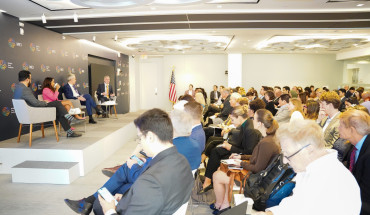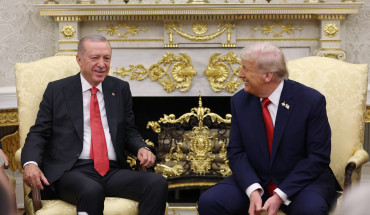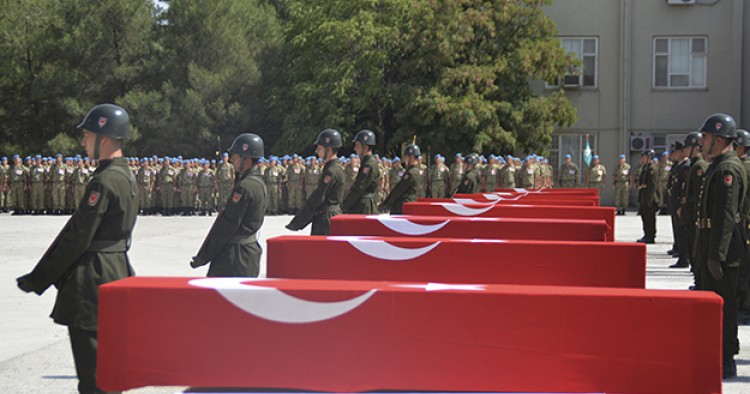With less than two months left until the parliamentary elections in November, Turkey is engulfed in deepening chaos and growing violence. The peace process between Turkey and the PKK that began in 2013 collapsed in July when the PKK killed two Turkish policemen it believed were linked to the Islamic State. The PKK attack was in retaliation for an Islamic State bombing that killed 32 student activists at Suruc on their way to Kobani.
That in turn triggered widespread civil disorder and more killings across the mainly Kurdish southeast of the country. Hundreds of militants and more than 100 police officers and soldiers have died since July in the worst violence Turkey has seen in two decades.
Nationalist groups took to the streets, assaulting Kurds and offices of the pro-Kurdish Peace and Democracy Party (HDP). The party’s offices in 56 provinces and districts were stoned, vandalized, and torched. On September 8, a mob of 500 people stormed the HDP headquarters in downtown Ankara and set the building on fire. In many cities and towns Kurdish-owned small businesses have been torched. In the west, angry crowds stopped buses traveling to the southeast, threatening passengers and breaking windows. Racist groups targeted Kurdish construction workers in Konya and Erzurum. The government imposed a curfew on the Kurdish town of Cizre to eliminate the PKK fighters in town, but tens of civilians have been killed in attacks by Turkish security forces.
Many in Turkey, including the majority of Kurds, believe that the government is attacking the PKK in order to eliminate the pro-Kurdish HDP from the next parliament. The HDP’s success in the June elections, in which the party captured a historic 13 percent of the vote, has made it a threat to the AKP’s quest for a majority. The HDP’s elimination would mean more seats for the AKP and the continuation of the current de facto presidential system in which Erdogan exerts a great deal of control over the government. Erdogan’s recent comment that if the electorate had given a certain party the required 400 deputies for a supermajority, the troubles that Turkey is experiencing now would not have come about reinforced that belief.
A recent investigation against the HDP’s co-chair Selahattin Demirtas serves as further proof to those who believe that the war with the PKK was part of Erdogan’s strategy all along. The charges against Demirtas include “openly insulting the Turkish nation” and “producing propaganda of a terror organization,” and proceedings to lift his immunity over a recent speech he delivered in which he criticized Erdogan and the AKP for instigating attacks against the Kurds are also underway.
But if the conflict with the PKK and the neutralization of the HDP were indeed Erdogan’s game plan, it is backfiring terribly. Further escalation of the Turkish-Kurdish conflict means more pressure on Turkey’s already fragile economy. In a rare admission by the AKP, Finance Minister Mehmet Simsek said political instability poses the biggest risk to the economy and could further hamper Turkey’s once stunning growth. The Turkish lira hit new lows against the U.S. dollar in early September, due to concern over the worsening security situation. The unprecedented intercommunal violence and daily clashes between security forces and PKK militants have also raised concerns over security at the November polls.
Both the PKK and the government stand to lose if the conflict is not contained soon. Public opinion polls in July and early August suggest that the AKP has scored a few points from nationalist circles due to the government’s heavy-handed military response, but that could change. There is growing criticism among nationalists that the government turned a blind eye to the military buildup of the PKK in the Kurdish region after the 2013 ceasefire. As violence spirals out of control, more and more nationalist-leaning voters might blame the AKP and Erdogan for launching the Kurdish peace process, empowering the PKK, and then launching an all-out war for narrow political gains.
The PKK, on the other hand, is tarnishing the image it has created in Western capitals after its effective fight against the Islamic State and is hurting the Kurds’ chances of a peaceful resolution of Turkey’s Kurdish question. Further violence will make it very difficult for both parties to resume the peace talks.
Yet neither side seems willing to back down. The AKP, betting on the nationalist votes to recapture a parliamentary majority in November, is likely to continue the fight, at least until the elections, by targeting the PKK’s urban structures, the HDP, and the senior PKK leadership in Iraq’s Qandil Mountains. Backed by a more confident and radicalized new generation of Kurds who lost faith in the peaceful resolution of the conflict, and with a steady stream of new recruits from Europe, Iraq, Syria and Turkey, the PKK will remain unwilling to compromise as well.
The PKK’s expanded influence in city centers in the Kurdish region feeds the young militants’ confidence further. Contrary to previous decades, the PKK now has a strong urban presence. PKK-linked militants have erected checkpoints and declared autonomous zones free from state control in cities across the southeast. As a result, the PKK has shifted its tactics from launching attacks from remote military outposts to city centers, which the PKK believes gives it the upper hand in its current fight against the state.
If Turkey’s recent history is any indication, there will be no winners in this war. Instead, the PKK’s urban warfare and the government’s heavy-handed response will kill more civilians, create more victims on both sides, heighten ethnic polarization, and weaken the moderate voice of the HDP. If the conflict is not contained soon, Turkey will delve into another round of years of violence.
The Middle East Institute (MEI) is an independent, non-partisan, non-for-profit, educational organization. It does not engage in advocacy and its scholars’ opinions are their own. MEI welcomes financial donations, but retains sole editorial control over its work and its publications reflect only the authors’ views. For a listing of MEI donors, please click here.













